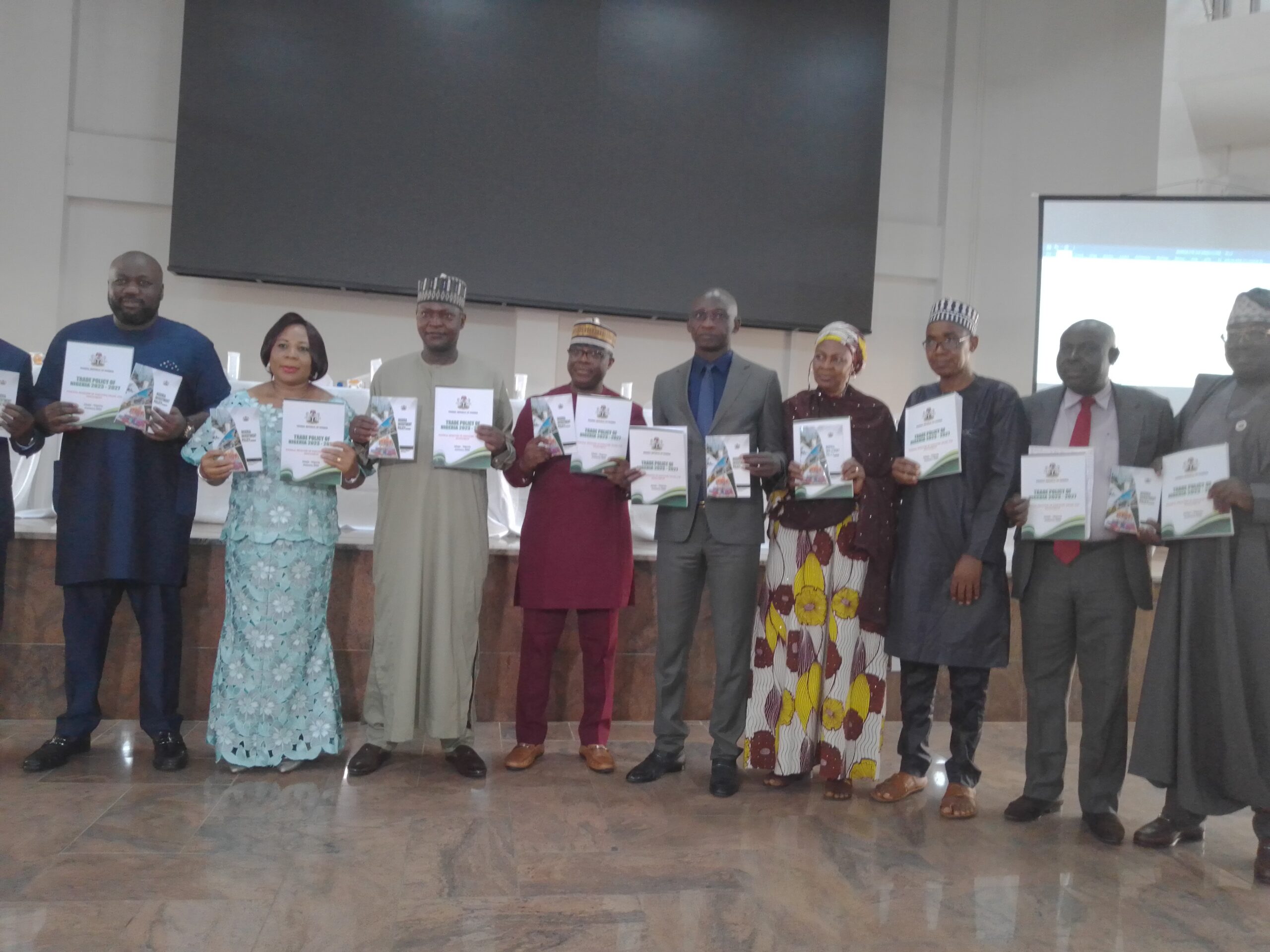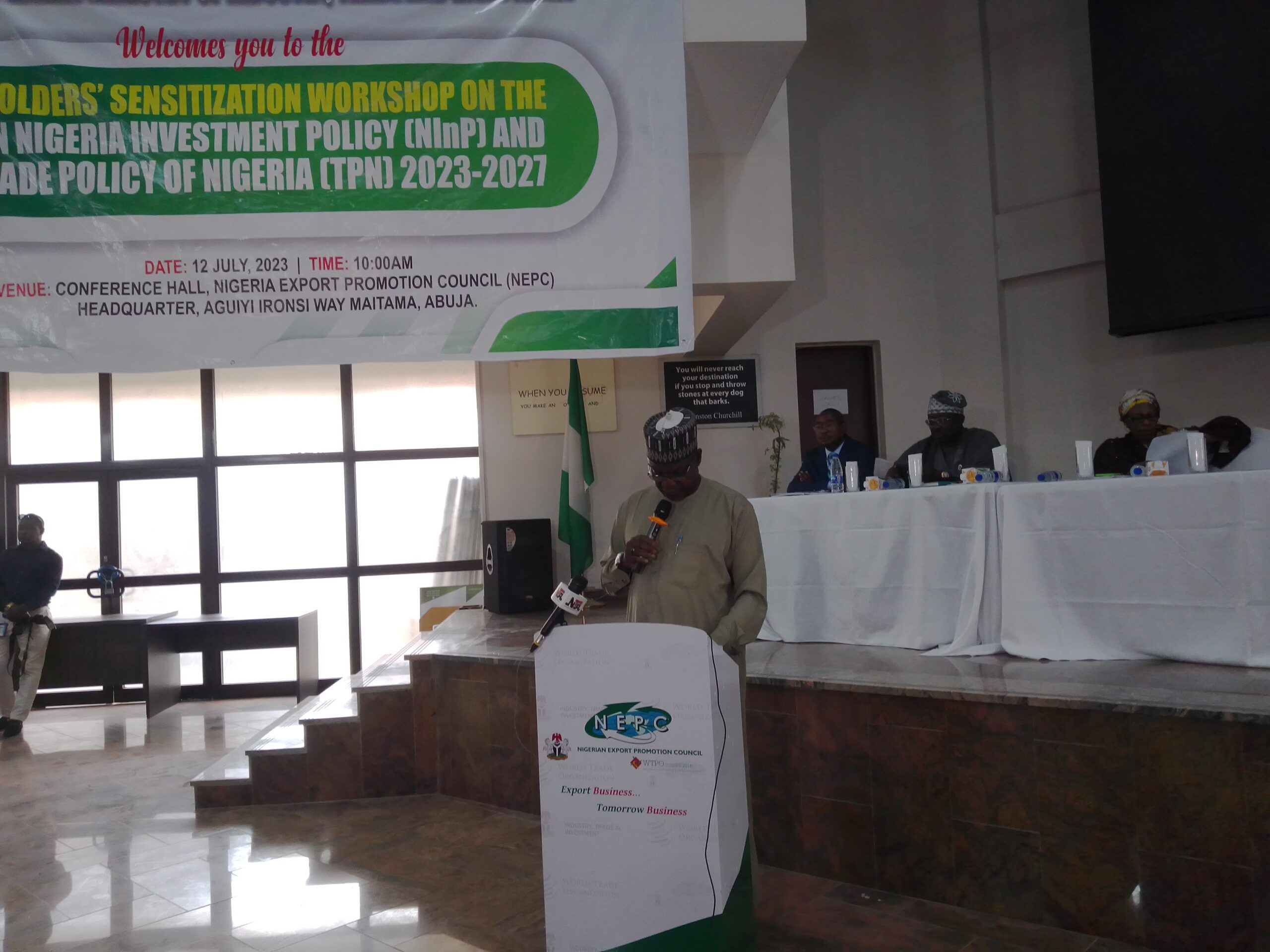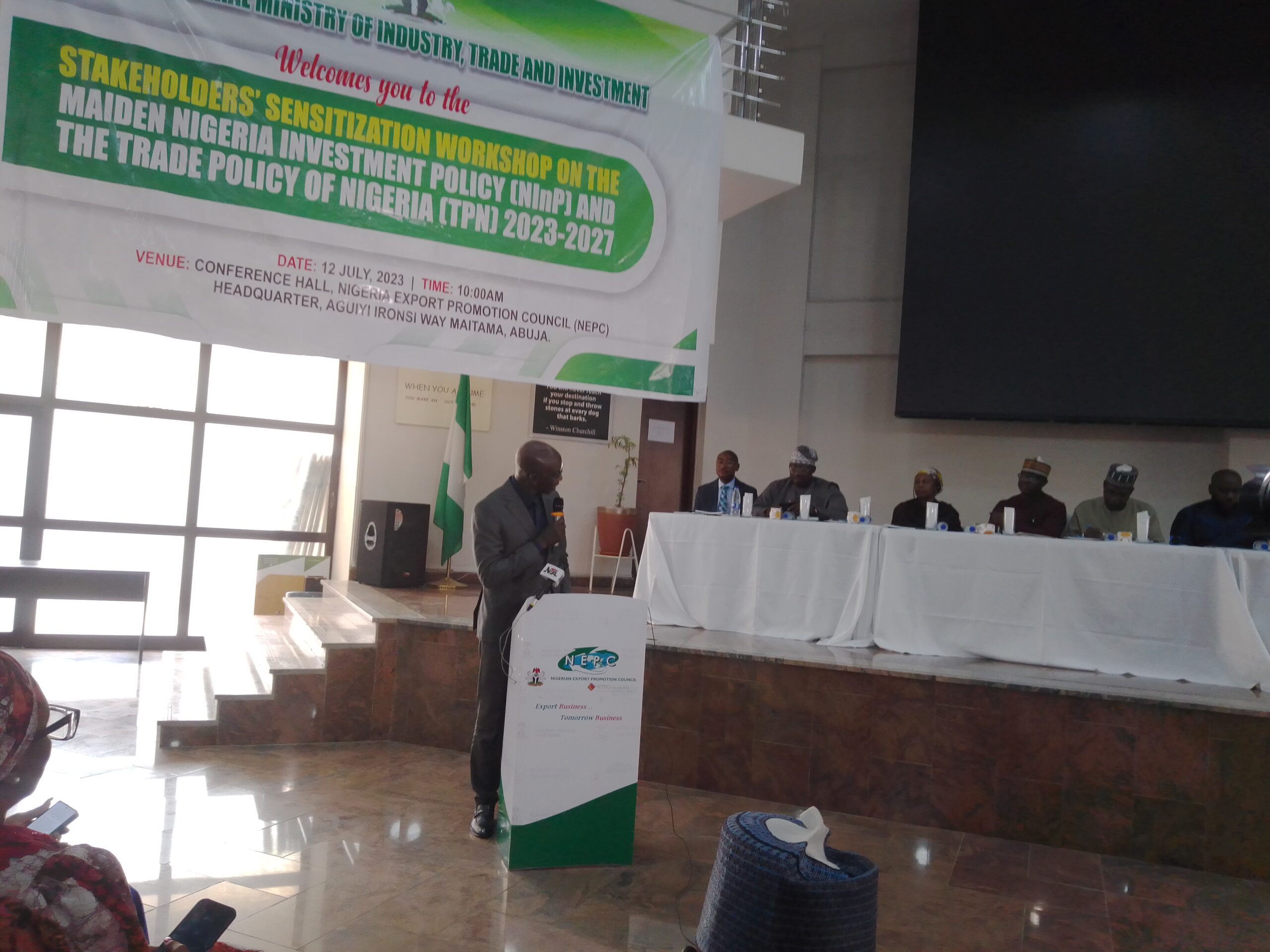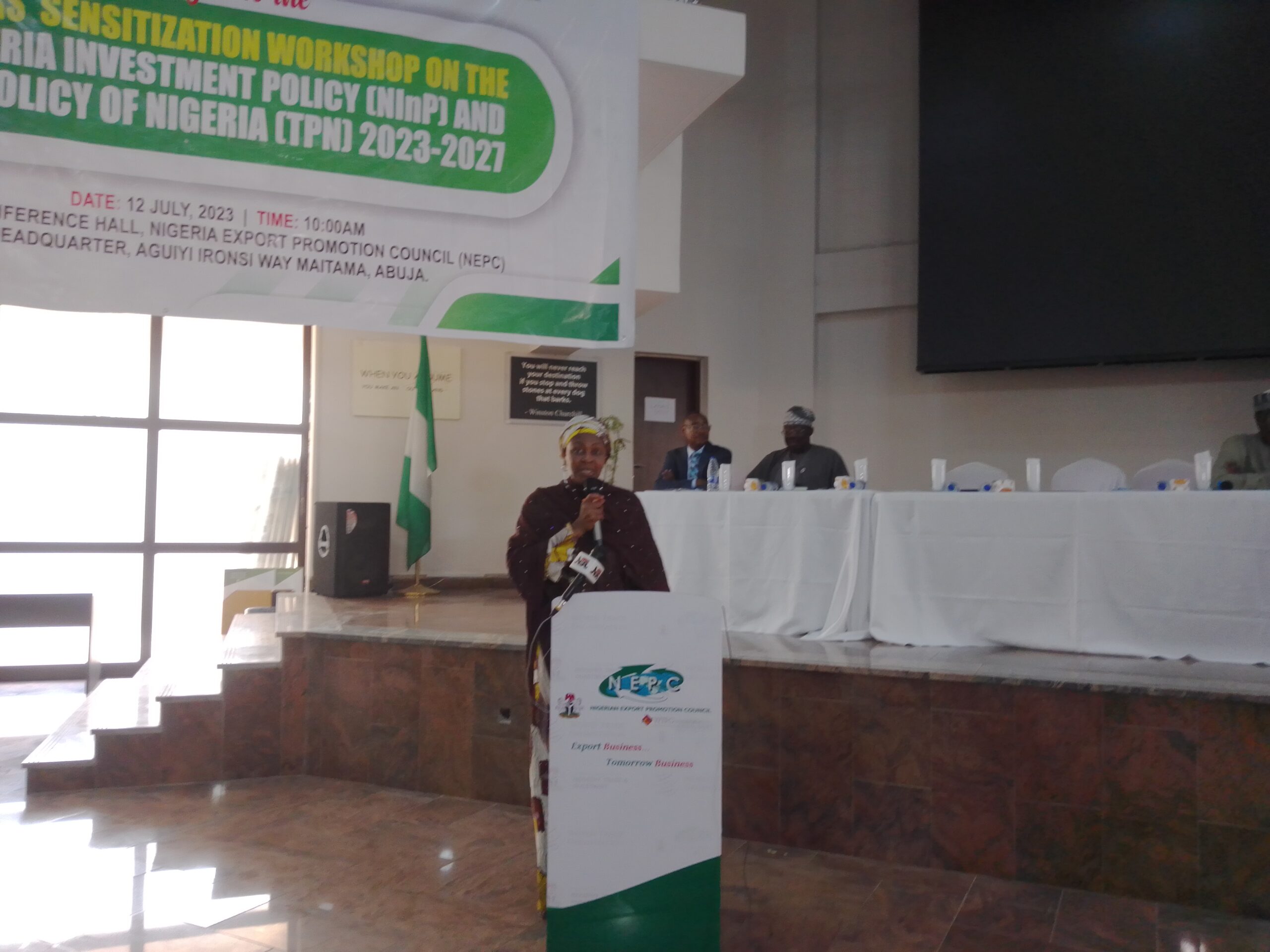
By Miriam Humbe
The Federal Government on Wednesday, launched the First Developed Nigeria Investment Policy 2023-2027 in Abuja.
As part of its stakeholders’ engagements, the Federal Ministry of Industry, Trade and Investment, (FMITI) held a Stakeholders’ Sensitization Workshop on the First Developed Nigeria Investment Policy 2023-2027 with attendees from government and organised private sector.
The event which took place at the premises of the Nigeria Export Promotion Council (NEPC) in Abuja was formally declared open by the Ministry’s Permanent Secretary, Dr. Evelyn N. Ngige.
Representative of the Permanent Secretary, who is the Director, Policy Planning and Statistics, Babagana Alkali delivered the keynote address on her behalf.
Humsimedia gathered that the two policy documents recently approved by the Federal Executive Council (FEC), were developed by the FMITI to address gaps and provide strategic frameworks to promote and enhance investment in the local economy and facilitate increased foreign and domestic trade.
The Perm Sec said that the NInP and TPN represented significant milestones in the country’s journey of economic growth and development.

Representative of the Perm Sec, Dr. Evelyn Ngige delivering the keynote address
Ngige said the Ministry remained committed to improving the domestic investment and business environment in order to position Nigeria as one of the World’s preferred investment destinations.
She said the development of the First Investment Policy and the review of the Trade Policy of Nigeria were useful outcomes of the sustained efforts of the Ministry in this regard.
Ngige said the NInP focused on three pillars: investment promotion, investment facilitation, and sustainable development.
She said: “The objectives for developing the investment policy framework, amongst others, include fast-tracking the process of Nigeria’s economic diversification, improving investment and business climate to attract both domestic and foreign direct investment as well as improving investors’ experience and confidence through ensuring compliance with global best practices, while generating inclusive domestic growth for employment generation and wealth creation.
“Additionally, the motivation for the development of the Nigeria Investment Policy is the need for policy certainty, stability and coherence in investment-related matters.
“Policy certainty and stability are very vital in attracting and sustaining investments in the local economy.
“The NInP, therefore, provides a comprehensive and harmonized framework that consolidates investment-related regulations at the national and sub-national levels.”

Executive Director, NEPC, Dr Ezra Yakusak
The Policy is also expected to create synergies with the objectives of other national economic frameworks and to promote Responsible, Inclusive, Balanced, and Sustainable (RIBS) Investments in the Nigerian economy.
On the other hand, the review of the Trade Policy of Nigeria (TPN) was carried out to align the document with emerging issues in global trade and Nigeria’s long-term goals of economic diversification, increase investment, employment generation, wealth creation, inclusive growth, sustainable development and export expansion.
Evelyn Ngige said the FMITI would continue to require the support of all stakeholders, particularly the private sector, to create an environment conducive to trade and investments as well as promote the growth of micro, small, and medium enterprises (MSMEs) in the country.
She said: “Through these collaborative efforts with private sector stakeholders, Government will be able to adequately address the current challenge of unemployment, promote industrialization, achieve import substitution, create wealth and support national economic development.”
She said the Ministry was working to set up mechanisms to track and assess the performance and impact of the two policies on the economy and gather feedback from stakeholders that will help strengthen the implementation.
Ngige said: “In this regard, the Ministry will be working in close collaboration with relevant Government Ministries, Departments and Agencies (MDAs) both at the Federal and State levels, as well as hold continuous dialogues and consultations with stakeholders from the private sector and development partners.”
She said the Ministry was still open to suggestions on how to impactfully implement the two policy documents.
The Perm Sec acknowledged the contributions and support of the immediate past Ministers of FMITI, Bank of Industry, the National Sugar Development Council, the FMITI technical team in the process of developing the policy documents.
Others acknowledged were the Nigerian Investment Promotion Commission (NIPC), Nigerian Export Promotion Commission (NEPC), Nigeria Export Processing Zones Authority (NEPZA) and the World Bank, United Nations Conference on Trade and Development (UNCTAD).
Others still were the Economic Community for West African States (ECOWAS), Private Investors for Africa, and United Nations Industrial Development Organization Information Technology Promotion Office Nigeria (UNIDO-ITPO Nigeria).
In a welcome remark, Director, Trade Department in the FMITI, Suleiman Adebayo Audu said that both policy documents, have a lifespan of four years.
Audu urged stakeholders to remain committed in strengthening collaborations, cooperation, partnerships and synergies, towards taking stock of progress made during implementation timelines.
He said this was with a view of tweaking and updating/upgrading the policy documents to align with current realities of the time period.
He appreciated the commitment of the Federal Government of Nigeria, especially FMITI, towards developing and implementing policies towards improving the Trade and Investment landscape in Nigeria.

Acting Executive Secretary, NIPC, Hajiya Gana Wakil
Also in a welcome remark, the Director, Investment Promotion Department in the FMITI, Gertrude Orji said: “I want to use this opportunity to congratulate our esteemed stakeholders and development partners for being part of the success story in the development and reviewing of the two-policy documents.
“Your contributions and support are highly appreciated.”
She revealed that the Federal Executive Council (FEC) precisely on the 10th of May, 2023 approved the implementation of the two policy documents, which marks the beginning of a new era in the investment climate of the country.
She said the approval came at a time when Nigeria as a country is making concerted efforts to achieve economic recovery and growth.
Executive Director of the Nigerian Export Promotion Council (NEPC) Dr. Ezra Yakusak assured that the NEPC would support any policy that would enhance trade facilitation in the country.
Dignitaries at the event included the Acting Executive Secretary, Nigerian Investment Promotion Commission, (NIPC), Special Assistant to the President on Industry, Trade and Investment, World Bank and UNIDO representatives, and representative of the Bank of Industry and President, Abuja Chamber of Commerce and Industry.


